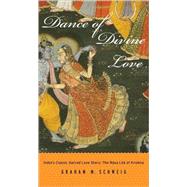Dance Of Divine Love
, by Schweig, Graham M.- ISBN: 9780691114460 | 0691114463
- Cover: Hardcover
- Copyright: 2/22/2005
The heart of this book is a dramatic love poem, the Rasa Lila, which is the ultimate focal point of one of the most treasured Sanskrit texts of India, theBhagavata Purana. Judged a literary masterpiece by Indian and Western scholars alike, this work of poetic genius and soaring religious vision is one of the world's greatest sacred love stories and, as Graham Schweig clearly demonstrates, should be regarded as India's Song of Songs. The story presents the supreme deity as the youthful and amorous cowherd, Krishna, who joins his beloved maidens in an enchanting and celebratory "dance of divine love." Schweig introduces this work of exquisite poetry and profound theology to the Western world in the form of a luminous translation and erudite scholarly treatment. His book explores the historical context and literary genre of the work and elucidates the aesthetic and emotional richness of the composition, highlighting poignant details of this drama of divine love. Schweig illuminates the religious dimensions and ethical nuances of the drama, drawing widely from the commentaries and esoteric vision of masters of the Caitanya school of Vaishnavism, a prominent devotional Hindu tradition. Themes such as transcendence of death through love, the yoga of devotion, the contrast between worldly love and passionate love for God, and the dialectical tension between ethical boundaries and boundless love are presented. The final event of the Rasa dance, the author concludes, presents a dynamic symbol of supreme love that provides the basis for a theological vision of genuine religious pluralism.







